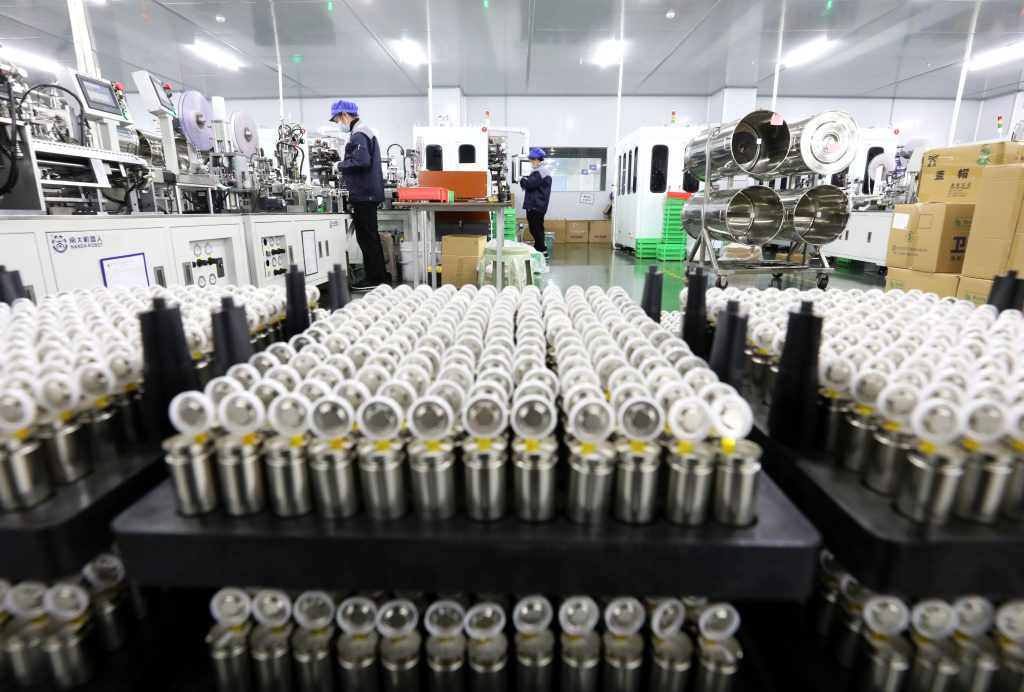South Korea has emerged as a solid partner for war-ravaged Ukraine. Not only do South Korea and Ukraine have common experiences straddling geopolitical fault lines, but Seoul has proven it is ready to share its experiences in postwar reconstruction and redevelopment with Kyiv.
Alleviating suffering of the Ukrainian people and helping Ukraine re-emerge from the ashes of war is Seoul’s immediate priority in its burgeoning partnership with Kyiv. But in the long term, the emerging South Korea–Ukraine relationship in the realm of lithium also stands to benefit Europe more broadly by helping Europe break China’s grip on the production of renewable batteries.
South Korea has become a battery cathode export powerhouse. Access to lithium, a resource which Ukraine reportedly has in abundance, is absolutely critical for South Korea’s ambition to hold a 40 per cent share of global battery production by 2030.
The partnership between Seoul and Kyiv presents an opportunity for South Korea to secure greater amounts of lithium. This will help Seoul tap into the European battery market, which is set to grow with the rise of electric vehicles.
Ukraine itself has partnered with neighbouring Poland, home to a major lithium-ion battery factory owned by South Korean company LG Energy Solution. Most batteries produced in Poland end up in Western Europe, positioning South Korea for greater participation in Europe’s battery markets.
This convergence of interests has not been lost on either Kyiv or Seoul, and throughout 2023, avenues to deepen cooperation were a consistent topic in meetings between the two countries.
In September 2023, following Seoul’s provision of humanitarian aid and deals to help with Ukraine’s reconstruction, South Korea’s Infrastructure Minister Won Hee-ryong met with Ukrainian president Volodymyr Zelenskyy to discuss South Korea’s participation in lithium mining as part of their renewable battery industry.
Several representatives from private South Korean companies accompanied Won Hee-ryong during his visit to the Ukrainian capital, potentially as part of the South Korean government’s bid to encourage greater private sector participation in securing supplies of critical minerals.
The broader regional promises of South Korea–Ukraine cooperation in the field of lithium extraction hinge in large part on South Korea’s ability to present itself as an alternative to China in the European battery market.
A European Union report published in September 2023 warned that Beijing’s dominance in global battery production could leave Europe vulnerable. This has prompted calls for the European Union to pursue greater independence from China, and by extension all Asian battery producers.
For South Korea one of the main challenges it faces in leveraging a lithium partnership with Ukraine is doing so independently of Chinese entities.
Seoul’s ability to position itself as an independent actor in the race to secure supplies of lithium is particularly urgent in light of the US Inflation Reduction Act (IRA), which contains provisions limiting US partners’ ability to cooperate with China. Chinese entities may have no more than a 25 per cent stake in a South Korean firm, otherwise these firms fall under US provisions governing foreign entities of concern.
Unfortunately, it has proven difficult for Korean industries with vested interest in critical minerals to avoid cooperation with Chinese firms.
China’s stranglehold on much of the world’s lithium supply has often forced South Korean companies to team up with Chinese counterparts. South Korea risks becoming overly dependent on China in order to access its lithium reserves.
South Korea is already highly dependent on China for access to the critical minerals needed for some of its most powerful industries. In 2023 alone, South Korean firms such as POSCO and SK On have signed agreements with China-based companies to cooperate on the extraction of minerals such as lithium and nickel.
Despite these challenges, there are several options that South Korea can explore to mitigate these risks and reap benefits.
South Korea’s participation in the United States-led Mineral Security Partnership, which includes both the European Commission and individual European states, provides Seoul with an avenue to pursue greater independence from China and closer cooperation with European partners.
Focussing on battery recycling could help mitigate the risk of not having a sufficiently large or continuous supply of lithium. Should Seoul manage to find a way to gain access to Ukrainian lithium independent of restrictive partnerships with Chinese entities, advancements in battery recycling may help South Korean firms invest in Ukraine’s natural resources and secure a constant supply independent of Chinese actors.
Ultimately, South Korea will need to present itself as the best Asian partner for Kyiv in the realm of lithium extraction, while also proving to other European partners that it can participate in Europe’s renewable battery industry without worsening their over-dependence on China.
Should South Korea manage to pull this off, it can position itself as not merely as a long-term economic partner for a Ukraine, but also other European partners.
Anthony V Rinna is Senior Editor at the Sino-NK research group.

